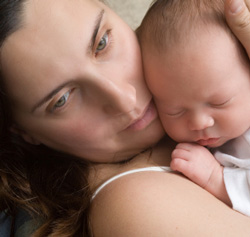Perinatal Depression and Anxiety


by Diana Lynn Barnes, Psy.D., LMFT
There is no more profound transition in the life of a woman than her passage into motherhood. It touches us at so many different levels – physiologically, emotionally, psychologically and even spiritually. With motherhood comes a pronounced shift in our internal sense of us in the world. This psychological metamorphosis often feels like a crisis of identity as new mothers try to adjust to the sudden and dramatic change in their lives. It can often seem as though we are teetering between two worlds – the familiar world we left behind – the world where routine, time, companionship and freedom were an expected constant – and the current world which, particularly during the first year postpartum, is unpredictable, routine-less, and certainly lacking in the freedom to move about our day without having to first consider the seemingly relentless needs and requirements of a newborn. In order to fully embrace motherhood, we need to mourn the life that appears to have been left behind so that we can create a successful balance between that life we knew and the eye-opening physical and emotional challenges of the first year postpartum.
Our ideas about “good” mothers are embedded in social and cultural expectations and further complicated by the many myths that have a pervasive influence on how new mothers believe they should look and how they should feel. Societal messages about mothering as automatic and instinctive, beliefs that the initial bond with their babies must be instantaneous and magnetic leaves so many new mothers feeling discouraged and disappointed when they come face to face with the discrepancies between cultural fantasies and the realities of motherhood. In fact, the myths of motherhood play such an important role in the psychology of pregnancy and the postpartum period that these idealized notions leave many women vulnerable to the downward spiral of depression.
Interestingly, there are more psychiatric admissions around the child-bearing years than at any other time in the female life cycle. And statistically, approximately 15% of women each year will suffer with some form of postpartum depression. Even pregnancy, once thought to be protective against depression and anxiety, is now understood to be a delicate time for the emergence of mood-related disorders. The perinatal period and the accompanying risks for a mood or anxiety disorder begin at conception and extend through the first year postpartum.
As many as 3 out of 4 women who give birth will experience some anxiety-related symptoms following childbirth – tearfulness, sleep and appetite disruptions, as well as mild ups and downs in mood.
In most cases, the stresses of birthing and the expected period of adjustment to this profound life change along with the sudden and dramatic shifts in hormonal levels following childbirth are at the origin of the baby blues. These mild and transient symptoms, which feel very much like the emotional changes around the menstrual cycle, and are actually considered a normal part of postpartum adjust- ment, usually surface around the third or fourth day after delivery and then diminish by two to three weeks postpartum.
Postpartum depression has a more extensive list of symptoms than the baby blues and there are a number of ways in which these symptoms present from woman to woman. The most common presentation of postpartum depression is with anxiety that is often so extreme, mothers feel paralyzed and unable to cope with the needs of their infants. There are dramatic interruptions in sleep and appetite along with sensations of “fogginess,” and detachment from their babies, the latter often described as “going through the motions,” of responding to their babies, but unable to feel affection and love.
In other types of postpartum depression, mothers may be bombarded by intruding thoughts and images, often so disturbing, that they invent strategies to avoid what they believe may be inevitable as experienced through the pictures and ideas in their head. They may be counting bottles and diapers, or checking multiple times to see if their babies are breathing, unable to sleep, with eyes and ears glued to the baby monitor. They may believe their babies are ill, despite all reassurances from the pediatrician. Others may be overwhelmed by panic attacks that can feel just like a heart attack, and can even awaken them out of their sleep. For some women, unexpected events during birth can cause trauma. Sometimes, the act of giving birth can be a painful reminder of traumatic events that have occurred earlier in their lives leaving them feeling powerless and victimized.
Although exceedingly rare, and affecting only 1 or 2 out of every thousand women who give birth, postpartum psychosis is a potentially life-threatening medical emergency that requires immediate treatment. It is important to note that psychosis is not a severe form of postpartum depression, but exists as a completely separate disorder. Postpartum Depression does not evolve into Postpartum Psychosis. It is considered a bipolar episode; therefore, women with personal or family histories of Bipolar Disorder, Schizophrenia or Schizoaffective Disorder seem to be at increased risk.
It is not necessary to wait until you give birth to “find out” whether you are one of the 800,000 to 1 million women each year who experience postpartum depression. Identifying your risks during pregnancy, and even before conception, can be critical to protecting yourself from a severe symptoms of perinatal illness and in a number of cases, actually prevent the onset of a perinatal mood disorder. If your obstetrician doesn’t ask you about your risks and you believe that you might be, let him know that you think you may be at risk so that you can receive a proper referral to a perinatal psychiatrist or a therapist who specializes in reproductive mental health. Some of the biological and genetic risk factors include the following:
- A personal or family history of depression or anxiety
- A personal or family history of bipolar disorder
- Depression and/or anxiety during pregnancy (the most significant predictor of postpartum depression)
- A previous episode of postpartum depression (women with one untreated episode raise their risk for a more severe recurrence in the next pregnancy by 50 – 75%).
- A family history of postpartum depression
- Significant mood changes around the menstrual cycle
- A personal or family history of thyroid illness
The most common complication of pregnancy is perinatal depression and anxiety. However, with proper care, these illnesses are among the easiest to treat. If you are experiencing depression during pregnancy or in the postpartum period, it is essential that you remind yourself that you are not to blame for how you are feeling and have done nothing wrong to cause the depression, that you are not alone because there are a growing number of health care providers who are understanding more about the nature of this disorder and because there are avenues to seek out emotional support, and finally, with the proper treatment, you will get well.
Contributor Diana Lynn Barnes, Psy.D., LMFT is an internationally recognized expert on the assessment and treatment of perinatal mood disorders. She is in private practice with offices in Sherman Oaks and Pasadena California. A past president of Postpartum Support International, Dr. Barnes is a member of the Los Angeles County Perinatal Mental Health Task Force and the statewide California Maternal Mental Health Collaborative. She is the co-author of The Journey to Parenthood: Myths, Reality and What Really Matters. www.postpartumhealth.com and www.themotherhoodconsortium.com.
Reprinted with permission from the Wet Set Gazette, Pasadena, CA




